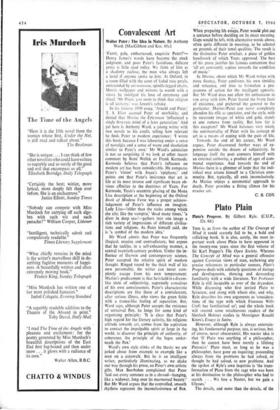Convalescent Art
'FAINT, pale, embarrassed, exquisite Paterl'— Henry James's words have become the stock judgment, and poor Pater's fastidious, delicate prose is little read today. We think of him as a shadowy recluse, the man who always left a hotel if anyone spoke to him. At Oxford, in a room filled with the scent of faded rose petals, surrounded by art nouveau, spindle-legged chairs, Morris wallpaper and mirrors (a womb with a view), he indulged his love of ceremony and ritual. `Mr Pater, you seem to think that religion is all idolatry,- was Jowett's rebuke.
In his famous 1930 essay, 'Arnold and Pater,' T. S. Eliot accused Pater of morbidity, and denied that Marius the Epicurean 'influenced a single first-rate mind of a later generation.' And yet here is Anthony Ward, a young writer with two novels to his credit, telling how relevant he finds Pater to modern experience: 'I wrote this book because I was labouring under a sense of nostalgia and a sense of waste and desolation similar to Pater's own.' Mr Ward's admission is not so surprising if we look at other recent comment by Rene Wellek or Frank Kermode. Kermode believes that Pater's influence on modern art has been considerable. He compares Pater's `vision' with Joyce's 'epiphany,' and points out that Pater's insistence that art is life at its most intense and significant bears ob- vious affinities to the doctrines of Yeats. For Kermode, Yeats's eccentric placing of the Mona Lisa description at the beginning of the Oxford Book of Modern Verse was a proper acknow- ledgement of Pater's influence on imagism. Lady Lisa—`older than the rocks among which she sits; like the vampire,' dead many times,' a diver in deep seas'—gathers into one image a rich variety of impressions of different civilisa- tions and religions. As Pater himself said, she is 'a symbol of the modern idea.'
Mr Ward admits that Pater was frequently illogical, evasive and contradictory, but argues that he tackles, in a self-exhausting manner, a central twentieth-century problem. Under the in- fluence of Darwin and contemporary science, Pater accepted the relative spirit of modern thought. Ringed round by the thick wall of his own personality, the writer can never com- pletely escape from his own temperament. Marius's predicament is that he is held in a dream- like state of subjectivity, supremely conscious of his own consciousness. Pater's characteristic descriptions are like those of a convalescent, after serious illness, who views the green fields with a trance-like feeling of separation. But, Ward says, although Pater accepts the existence of universal flux, he longs for some kind of organising principle: It is clear that Pater's high regard for the literary activity, his religious attitude towards art, comes from the aspiration to contact the impalpable spirit at large in the world, to discover the principle of authority, of coherence, the principle of the logos under- neath the flux.'
Ward's own style stinks of the thesis; we are jerked about from example to example like a man on a cakewalk. But he is an intelligent writer, particularly illuminating, as we shake Our way through his prose, on Pater's own artistic gifts. Max Beerbohm complained that Pater 'laid out every sentence as in a shroud—hanging, like a widower, long over its marmoreal beauty.' But Mr Ward argues that the controlled, smooth rhythms represent the inconclusiveness of flux. When preparing his essays, Pates Would plot-out a sentence before deciding on its exact meaning. Gaps would be left, with alternative words above, often quite different in meaning, to be selected on grounds of their tonal qualities. The result is the distinctive Pater artefact, a piece of golden handiwork of which Yeats approved. The best of his prose justifies his famous contention that 'all art constantly aspires towards the condition of music.'
In Marius, about which Mr Ward writes with more fluency, Pater confronts his own timidity andY reticence, and tries to formulate a pro- gramme of action for the intelligent agnostic. But Mr Ward does not allow his enthusiasm to run away with him. Pater feared the brute facts of 'existence, and preferred the general to the particular. Marius/Pater can never completely abandon his role as spectator, and the style, with its recurrent images of white and gold, stands at one remove from reality. But how far is this escapism? Mr Ward balances very nicely the sentimentality of Pater with his concept of art as a means of coping with the pain of life.
Towards the end of his career, Mr Ward argues, Pater discovered further ways of ex- pansion outside the dream of subjectivity. In language itself the poet connects himself with an external authority, a product of ages of com- munal experience. And towards the end of Marius there is a glimmer of hope that the indi- vidual may attune himself to as Christian com- munity. But, typically, all ends inconclusively. As Marius enjoys a ceremonial approach to death, Pater provides a fitting climax for his evasive art.
C. B. COX


































 Previous page
Previous page